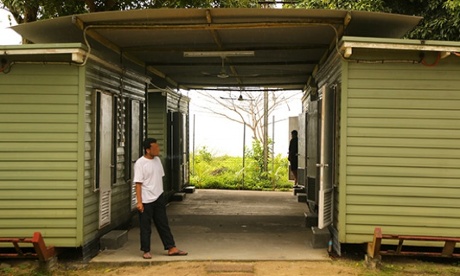Asylum-seeker conditions inhuman and unlawful, UN committee tells Australia
Detention
centres set up on Manus Island and Nauru criticised by Committee
Against Torture, which lays blame at Australia’s doorstep
centres set up on Manus Island and Nauru criticised by Committee
Against Torture, which lays blame at Australia’s doorstep

Supplied image of an asylum seeker arriving on Manus Island, Papua New Guinea
Conditions on Manus Island and Nauru – the island states to which
Australia sends asylum seekers – amount to “cruel, inhuman, and
unlawful” punishment, the UN Committee Against Torture has told the
Australian government, while new laws to make it easier to forcibly
return asylum seekers to their homeland could breach the Convention
Against Torture.
Australia appeared before the UN committee in Geneva on Monday, where the committee heard that a migration amendment bill that is before the Senate would make it easier for Australia to send people back to torture, in breach of international law.
Australia ratified the torture convention in 1989, and is legally
bound by it. The convention not only outlaws torture, but prohibits
forcibly sending someone to a place where they could be tortured.
Australia has a statutory “complementary protection” obligation for
asylum seekers who fall outside the refugees convention but who are
still fleeing persecution in their home country.
The migration amendment (protection and other measures) bill before
the Senate would raise the threshold for complementary protection from a
“real chance” of persecution to “more likely than not”.
Essentially, if someone faced a 50% chance of being tortured in their home country, Australia could forcibly return them there.
Sophie Nicolle, the government relations adviser for Amnesty
International Australia who appeared before the committee, told Guardian
Australia the UN was highlighting what had been known domestically for
some time.
“And what we’d hope is that this kind of international scrutiny will
make Australia stop and think about the example we’re setting. It’s
really concerning for Australia, which is such a world leader in some
areas, to have so many black marks when it comes to our obligations
under this convention.”
Nicolle said under the proposed law changes “it would be impossible to safeguard against people being returned to torture”.
The Association for the Prevention of Torture told the UN in
submissions: “This higher threshold would amount to a violation of
Australia’s obligations under the United Nations Convention Against
Torture.”
In putting the bill before parliament, the immigration minister,
Scott Morrison, said the government would use a 50% chance of
“significant harm” for determining whether someone could be sent home,
which “reflects the government’s interpretation of Australia’s
obligations”.
However, the Australian parliament’s human rights committee –
dominated and chaired by Coalition members – said the legislation “was
incompatible with Australia’s human rights obligations”.
“As a principle of international law, it is not open for a state party to unilaterally reinterpret its obligations.”
Australia’s treatment of asylum seekers and refugees was the focus of
the first day of Australia’s hearings before the UN’s Committee Against
Torture in Geneva.
The committee told Australia conditions on the island detention
centres of Manus Island and Nauru were “cruel, inhuman, and unlawful”,
and particularly condemned the mandatory detention of children.
The island detention centres have been the focus of consistent media attention since the deaths on Manus Island of Reza Berati and Hamid Kehazaei, and reports of violent attacks on child refugees on Nauru.
The committee’s chair, Claudio Grossman, said Australia could not
blame Nauru and Papua New Guinea for the conditions on the islands. He
said Australia had “effective control” of detention conditions.
“It is not convincing to claim Australia is not responsible for these people … Australia pays the bills,” he said.
Grossman said Australia should not punish asylum seekers because they
had arrived in the country by boat, or had paid people smugglers for
the journey.
“People smugglers could be smuggling people with valid refugee claims
… desperate people running from desperate situations sometimes resort
to smugglers,” he said.
And the committee questioned whether asylum seekers intercepted at
sea and questioned on board ships were being properly assessed for their
asylum claims.
The committee queried whether the 41 asylum seekers returned to Sri
Lanka and the 157 people taken to Nauru after being held for a month at
sea had access to legal advice and were asked questions in a language
they understood.
“How can you be sure you don’t return people to torture if you just
ask them a few questions on a boat?” one committee member, Jens Modvig,
asked.
Australia’s ambassador to the UN in Geneva, John Quinn, said
Australia was working co-operatively with its regional neighbours to
combat people-smuggling operations.
“The Australian government has strengthened its policies to ensure
the protection of migrants, including asylum seekers, to prevent their
exploitation at the hands of people smugglers,” he said.
The ambassador said proposed legislative changes would “enhance the
fairness, accountability, and integrity” of Australia’s asylum-seeker
regime.
The Australian delegation, headed by Quinn, will reply to the
committee’s concerns on Tuesday afternoon, Geneva time. “You’ve given us
a lot of homework to do,” Quinn said.
Morrison announced on Tuesday that a dedicated team within his
department would oversee the management of immigration detention
centres.
“The detention assurance team will monitor the effectiveness of the
high standards in place for detention service providers including, where
necessary and appropriate, recommending action to deal with credible
allegations of misconduct should they arise,” he said.
The UN committee is to hand down its report on Australia on 28 November.





No comments:
Post a Comment